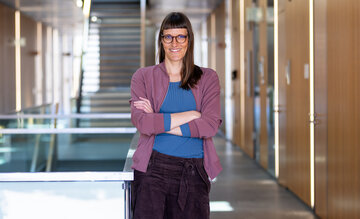New perspectives for research and practice via a lifespan model
Images of age develop dynamically over the entire lifespan. They shape our thoughts, feelings and actions. They interact with our personal development, our experiences and our health – from a young age and into old age. Differentiated images of old age that focus on the potential of ageing lead to people behaving more healthily, taking better precautions, feeling better and also being objectively measurably healthier. People with positive images of ageing even have a higher life expectancy.
Negative stereotypes and age discrimination pose a risk for undifferentiated, negative images of old age. Negative health events can also damage age images. It is therefore important not to attribute these to ageing. Lifelong physical activity makes people feel younger. And those who feel younger are more likely to take up productive everyday activities.
All of this is demonstrated by the work of the DFG Scientific Network on Images of Ageing. New theoretical, methodological and empirical perspectives and findings on the role of images of ageing across the lifespan have been compiled and developed. Some important empirical research gaps were closed using national and international data. A life-span approach to images of ageing was also developed and scientific survey instruments for images of ageing were systematised, evaluated and innovative approaches proposed in a review paper.
White-Paper with 6 inititiatives for more diverse images of ageing
In a 41-member group of authors, we formulate six impulses - from the appeal to enable participation and shape a positive culture of ageing to the demand to clearly name stereotypes and ageism and to stand up against them. We see the paper as a self-commitment and call on stakeholders from science, the media, politics and education to support these demands. We need to stand up for diversity and promote diverse "colorful" role models.
Video with food for thought on images of age
In the video, we explain what age images are, how they arise, how they affect us and why it is important that we address them. Throughout life, images of age are an important driver of mental and physical health and intergenerational solidarity.
We invite you to reflect, question and discuss.
We all have images of ageing - what are yours?
Special Issue in the European Journal of Ageing
We have published key findings from the DFG's Images of Ageing Network in a special issue of the European Journal of Ageing. In eight scientific articles, we present our life-span approach, an overview of our methods and empirical findings, e.g. that young and old people are more similar than we think: they hardly differ in how creative, energetic or wise they feel.
Project Partners
- Prof. Dr. Verena Klusmann (Speaker, PI)
- Dr. Ann-Kristin Beyer, Robert Koch Institute, Department of Epidemiology & Health Monitoring
- Dr. Anne Blawert, Friedrich Alexander University Erlangen, Nuremberg
- Dr. Catherine E. Bowen, University of Vienna
- Dr. Martina Gabrian, University of Heidelberg (until 2021)
- Prof. Dr. Eva-Marie Kessler, MSB Medical School Berlin - University of Applied Sciences for Health and Medicine
- Prof. Dr. Anna E. Kornadt, Université du Luxembourg, Maison des Sciences Humaines
- Jun.-Prof. Dr. Nanna Notthoff, Leipzig University, Exercise Psychology
- Dr. Svenja M. Spuling, German Center on Aging
- Dr. Maja Wiest, Fürst Donnersmarck Foundation
- Prof. Dr. Susanne Wurm, University Medicine Greifswald, Prevention Research and Social Medicine
Your contact
I'm happy to answer any questions you have about the project
